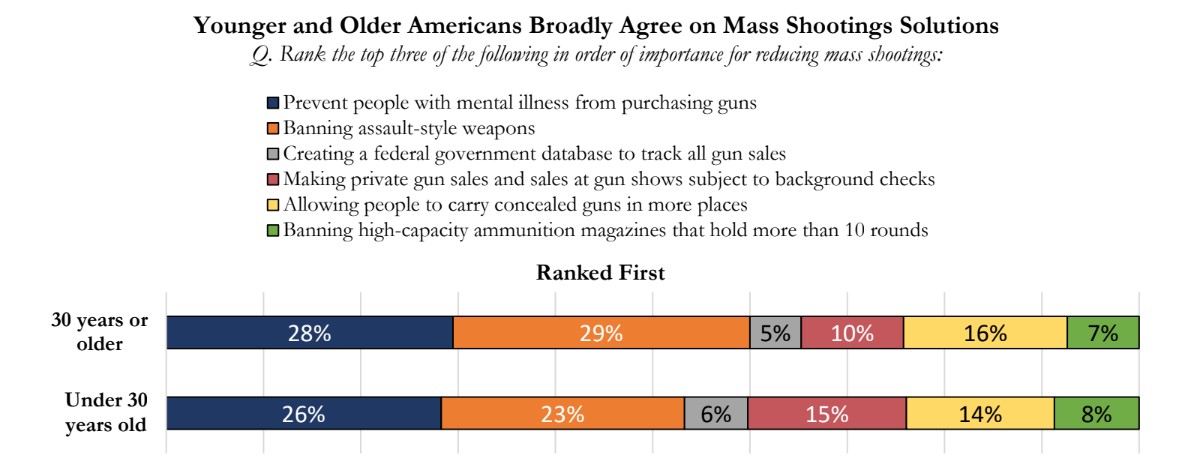Poll Sheds Light on the Public’s Perceived Solutions to Mass Shootings
Full report on the latest UMD Critical Issues Poll shows how Americans’ race and age influence opinion on how to prevent gun violence against multiple people
A new, full report on the latest UMD Critical Issues Poll shares additional insights on the gun violence points by which Americans are similar, and different.
“Gun violence is one of the most critical issues confronting our society. Like others around the country, we will continue to probe to get a fuller understanding of public views on the issue. In this unique report, we combine the data from our findings with the haunting art about victims of gun violence from our Sadat Art for Justice and Peace competition,” said Professor Shibley Telhami, director of the poll.
The poll question with the most nuanced assortment of American responses involved survey participants ranking from most important to least important three of six potential solutions for preventing mass shootings.
Looking at respondents’ top three solutions by race, White Americans and Hispanic Americans are more closely aligned than they are with Black Americans, especially regarding a potential assault weapons ban, and a potential increase in the number of places Americans can concealed carry. Almost exactly one-half of White American respondents ranked “banning assault-style weapons” in their top three, as did 46% of Hispanic Americans. Similarly, 37% of White Americans and 38% of Hispanics Americans listed “allow people to conceal carry guns in more places” in their top three preferred solutions.
By comparison, a significantly higher percentage of Black Americans (66%) ranked an assault-style weapons ban in their top three. A significantly smaller percentage of Black Americans (just 18%) ranked a concealed carry expansion in their top three.
Shared opinions on the most important mass shooting solutions were also identified among older and younger American respondents. Comparing first-ranked responses from respondent Americans under 30 with the first-ranked responses from respondent Americans over 30, the percentages for each solution closely mirrored one another. The greatest difference in opinion was 23% of Americans under 30 ranking “banning assault-style weapons” first, compared to the 29% of Americans over 30 who did the same.

Where greater differences between older and younger American respondents were seen was in their top three responses overall. For example, though there was only one percentage-point difference in the number of young Americans and older Americans who selected “creating a federal government database to track all gun sales” as their first response, 42% of young Americans ranked it in their top three choices, compared to only 28% of older Americans. Four in ten young Americans ranked “allowing people to carry concealed guns in more places” in their top three choices, compared to only 32% of older Americans.
Looking at potential patterns of agreement between respondents’ age and race, the researchers found that while younger Americans ranked responses most closely with White Americans, they more closely aligned with Black Americans on their thoughts on how stricter requirements for legally obtaining guns would impact mass shootings. Sixty-two percent of Black Americans and 67% of young Americans said that such requirements would lead to fewer mass shootings, whereas only 47% of White Americans and an identical share of older Americans said the same.
"Our findings, in line with other surveys from previous years, show that race and ethnicity are much more stable predictors than age of support for more restrictive gun policies. For some policies, young people are closer to older, white respondents, while for other policies, they are similar in attitudes to minority respondents,” explained Rouse. “This is a curious anomaly that does not intuitively track with the general ideological disposition of young people, but points to more nuance and complexity for them on this issue."
A preliminary analysis of the March 27-April 5 poll’s data highlighted some of the poll’s other greatest takeaways. One such takeaway was that Democrats and those born outside the U.S. are more likely to support greater gun restrictions compared to Republicans and those born inside the U.S. Another was that, compared to white Americans and Republican Americans, more Black, Hispanic, and Democratic Americans believe that more Americans with guns would lead to more crime.
Relatedly, when asked about ways to prevent gun violence against children, only 14% of foreign-born respondents said they believed that tighter school security was most likely to reduce gun violence compared to one-third of the respondents who were born in the U.S.
Photo of “The Weight of an Empty Gun” by Hartley B Carlson, a piece in the 2023 Sadat Art for Justice and Peace Collection, is by John Consoli/University of Maryland.
Published on Tue, Jun 6, 2023 - 11:41AM



